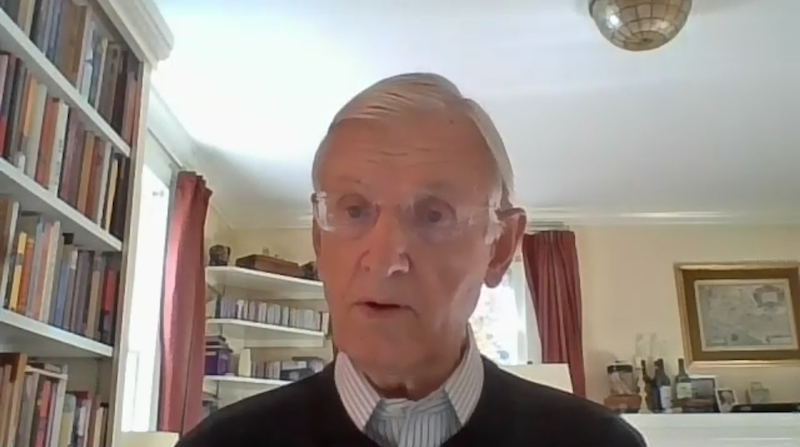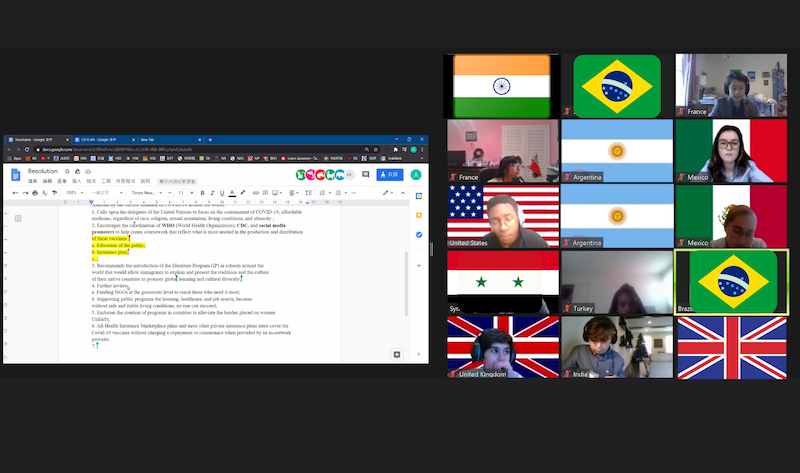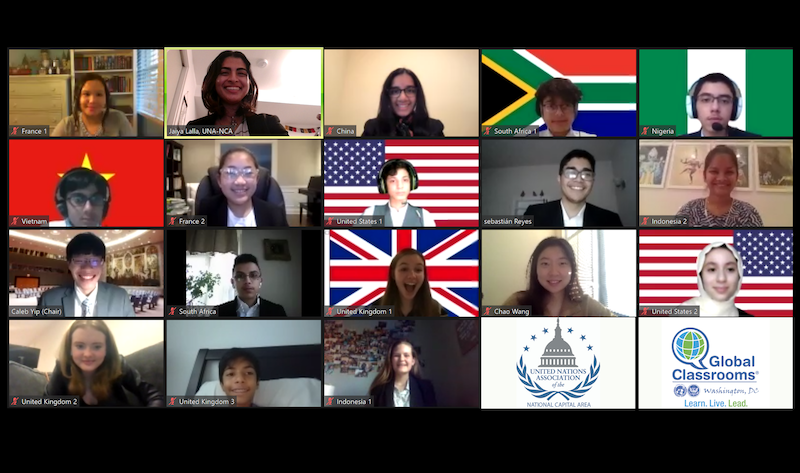This year’s conference was unique as it was GCDC’s first-ever virtual conference due to COVID-19 restrictions on in-person gatherings. This year’s conference featured 4 committees of no more than 50 students, each held over the course of two days to combat “Zoom fatigue.” The GCDC team were thankful for flexibility from students, chaperones, and conference staff as we all navigated the new format.

Despite the circumstances, GCDC was pleased to have 126 students from 11 schools attend across the 4 committee sessions. For many of the students, who were in 5th to 12th grade, this was their first Model UN experience.
Each committee session was opened by Paula Boland, President of UNA-NCA, with brief remarks. The GCDC team is thankful to have also had Dr. Ok Pannenborg serve as the keynote speaker for this year’s conference. Dr. Pannenborg has worked in over 20 nations around the world in his time at the World Health Organization, the United Nations High Commissioner for Refugees, the World Bank (as the chief health advisor), among other organizations. He delivered a speech on the importance of international cooperation in achieving global health goals, especially as it relates to access to vaccines in the current coronavirus pandemic. Finally, GCDC’s Senior Global Education Manager, Jaiya Lalla discussed her experience with Model UN and explained the logistics of the virtual conference to the delegates.
GCDC would also like to thank PAHO for their support for this year’s conference. Although the conference was not able to be held at the PAHO building, they provided excellent resources and an informative video on the importance of vaccines.
General Assembly Committees (1-3)
Given the circumstances surrounding the conference, the topics of debate couldn’t have been more timely. In the three General Assembly committees, delegates focus on the topic of “Access to Vaccines and Affordable Medicines.” Delegates began by delivering speeches about their nations’ experiences with outbreaks and stances on access to vaccines and other medicines. Soon, they began holding unmoderated caucuses, an informal period where each delegation strives to find common ground and form blocs with other like-minded nations. Eventually, after several hours of productive debate and writing across 2 committee sessions, the blocs completed their working papers, each containing specific, creative policy proposals to ensure fair and efficient distributions of affordable medicines.
In Committee 1, which took place in sessions on Monday and Tuesday morning, 28 delegates represented 16 countries. Overall, out of the two produced draft resolutions, the committee passed one resolution that prioritized vaccine distribution to countries with the most number of COVID-19 cases and in densely populated areas, raising income tax to pay for the vaccine, supplying vaccines in pharmacies and hospitals, and encouraging multilateral coordination in addressing this global pandemic.

In Committee 2, 28 delegates represented 17 countries, producing two draft resolutions through the two committee sessions on Wednesday and Thursday. The passing resolution recommended the creation a global fund for pandemic response funded by UN member states, improving education on vaccines, and advocating for global action against counterfeit vaccines.
Lastly, Committee 3 featured 53 delegates that represented 27 countries. Despite the large committee size, delegates produced 6 draft resolutions that focused on various facets of promoting affordable vaccines and medicines, including providing quality healthcare, combating misinformation on vaccines, lowering supply chain costs, and establishing microfinancing mechanisms for developing countries.
Crisis Committee
This year, the conference also featured a UN Security Council crisis committee for the first time. The crisis committee served as a training session for seasoned Model UN delegates who had experience at at least three prior Model UN conferences, but limited crisis committee experience. Session 1 began with an announcement of a new outbreak of the deadly Ebola virus in Sierra Leone. Delegates became familiar with the fast-paced nature of crisis committees and writing directives, or shorter versions of typical resolutions. By the end of Session 1, delegates passed two directives that highlighted the urgent needs of fund creation for containment efforts, enhancement of the medical delivery system, and increasing input of research and medical professionals.

In Session 2, delegates were confronted with another crisis update that reversed their progress in their previous session - the UN aid convoy, carrying medical supplies and personal protective equipment was attacked by an armed group on its way to Sierra Leone hospitals. Delegates had an hour and a half before violent action was taken by the local government. This session was designed to prompt delegates to consider the real-world impact of their policy recommendations and how crisis committees can collaborate with each country to solve urgent crises globally. With minutes to spare, the committee unilaterally passed two directives that emphasized the redistribution of the WHO trust fund, enhancement of security for the medical supplies, and implementation of mental health programs for frontline workers and patients, etc.
The Fall Training Conference is part of a year-long curriculum for students who care about their global and local communities. With the collaboration of its partners, GCDC creates a curriculum that uses Model United Nations to cultivate an international perspective, promote understanding of the UN system, and encourage students to interact with others from diverse backgrounds. The curriculum is used by middle schools and high schools from across DC, Maryland, and Virginia, and is an opportunity for students to become more active local and global citizens by being exposed to larger issues and different viewpoints.
The Global Classrooms DC Fall Model UN Training Conference is implemented by the United Nations Association of the National Capital Area, which is a chapter of UNA-USA. Each spring, GCDC also hosts a competitive Model UN conference. You can find out more information here.








